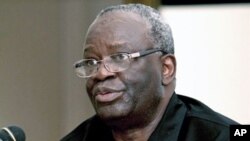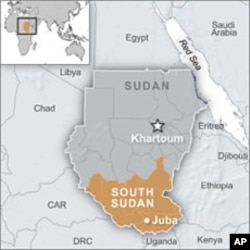Ibrahim Gambari runs the United Nations' largest peacekeeping operation in Darfur. The African Union-United Nations hybrid force known as UNAMID has more than 25,000 military, police and civilian staff with an annual budget of nearly $2 billion.
The referendum expected on January 9 will decide whether mainly African and Christian southern Sudan secedes from the mostly Muslim and Arab north.
Ibrahim Gambari says the lead-up to the referendum is having a significant impact on finding a lasting settlement to the Darfur conflict because some rebel movement leaders think if the south secedes, the Khartoum government will be weakened and they might be able to negotiate a better deal for themselves.
"Now I see it slightly differently. That even if that were the case, a weakened government is not necessarily the one to make the kind of hard decisions that are needed to address the root causes of the conflict in Darfur . So I would suggest that really this is the time to strike a deal," he said.
Gambari, a former Nigerian foreign minister and long-time U.N. diplomat, says there is also the issue of disputes in some areas about the borders between south Darfur and south Sudan.
"Imagine if the south becomes an independent country they become international boundaries, and then, so the flow of arms, and then of course some alliances between the SPLM [Sudan Peoples' Liberation Movement] and some of the armed movements in Darfur are real, and they could be used as proxies to continue, particularly if the separation does not go smoothly," said Gambari.
He says there is also the danger that the referendum will eclipse the issue of the Darfur peace process, which is taking place in Doha, Qatar.
"There is that danger, but I hope it does not happen, because these issues are pressing, people are dying. We still do not have a peace agreement," Gambari said. "The earlier we just continue to mobilize international support for end of fighting, achievement of a comprehensive agreement, the better, because then we will be putting the people of Darfur first, rather than their relationship to other political calendar and agendas."
The talks in Doha continue under the auspices of the Qataris and the U.N.-AU mediator Djibril Bassolé. But only the government of Sudan and one rebel group - the Liberation and Justice Movement (LJM) are talking. Two of the main movements - the Justice and Equality Movement (JEM) of Khalil Ibrahim and the Sudan Liberation Movement (SLM) of Abdel Wahid Al-Nur - are not participating.
Gambari says UN-AU mediator Djibril Bassolé has been very active in trying to negotiate a draft comprehensive peace agreement that addresses outstanding issues such as wealth and power sharing, compensation, the return of internally displaced persons and security arrangements, before the end of this year.
"Bassolé's hope is to get this done before the end of the year and leave the door open, so that hopefully if his efforts are complemented with efforts of the international community to get Abdel Wahid and Khalil Ibrahim to join, and then there is a complementary effort on the Darfur-Darfur dialogue and consultation, maybe something could happen before the end of this year, because the calendar is dictated by the referendum, I think," Gambari said.
Asked if the Darfuris harbor aspirations for their own state, he says he does not think so, they just want a fairer deal and the resolution of their outstanding issues.
The United Nations says more than 300,000 people have been killed and 2.7 million displaced from their homes since the conflict began in Darfur in 2003. Sudan's government puts the death toll much lower, at 10,000.














